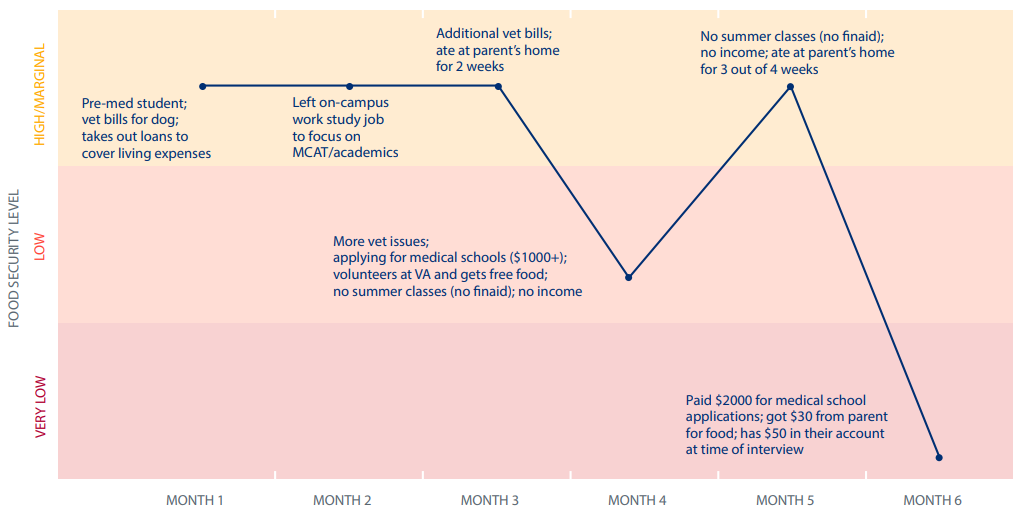Graduating a higher percentage of students may depend on how colleges address fundamental student needs — such as secure housing; reliable access to nutritious food; and affordable, flexible transportation that can swiftly ferry students between school, work and home. This seems like a tall order — and it is. However, recent research on food security from Trellis suggests that this basic need may not be intractable; instead, this latest study shows that food security fluctuates, with ebbs and flows throughout the school year. Understanding the dynamics behind these shifts can guide interventions that stabilize students’ basic needs and allow them to achieve their educational potential.
To capture this insight, the Trellis research team undertook an ambitious longitudinal study, which followed 72 students for nine months and resulted in 499 interviews concerning the effects of student finances on academic performance. The first report from this effort is “Studying on Empty: A Qualitative Study of Low Food Security Among College Students.”
Of 72 student participants, 36 experienced either low or very low food security — based on the six-question scale used by the U.S. Department of Agriculture — at some point during the study. This prevalence may surprise some, but is still slightly lower than the finding from the Trellis’ Fall 2018 Student Financial Wellness Survey (56%). Remarkably, each of those 36 students saw their food security fluctuate during the study. Let’s look at one student to illustrate how these shifts can occur. We’ll call her “Molly” to protect her identify.
Molly was food secure for the first three months of the study and had a restrictive, but attainable, budget. This changed in the fourth month, when her food security dropped from high/marginal to low because of unexpected expenses and a loss of income as she tried to concentrate on academics. Molly secured free food through volunteering efforts and from staying with her parents over the summer. This temporarily increased her food stock, but without additional financial aid or a regular source of income, her food security degraded to very low. By the sixth month, Molly nearly drained her savings paying over $2,000 in medical school applications; and although she received $30 from a parent for food, she had only $50 in her bank account at the time of the last interview. This left her vulnerable to the next financial shock — which, she feared, might force her to abandon her educational aspirations.
“Molly’s” Six-Month Food Security Experience

The Trellis study identified four major catalysts for improving food security:
- Employment (e.g., steady jobs that accommodate class schedules).
- Financial resources (e.g., financial aid and public assistance).
- Social networks (e.g., parents, siblings and friends that can cushion financial disruptions for students).
- Expenses (e.g., reduced expenses and financial plans for emergencies)
Molly’s difficulties were not readily apparent to her college; such visibility requires school administrators to be trained to identify signs of poverty and then be prepared to act quickly to address emergencies. Such colleges typically adopt some of these measures to restore basic needs security on their campus:
- Designate prominent spaces on campus to provide students with food pantries and other essentials.
- Connect eligible students to public benefit services (e.g., SNAP, WIC, TANF).
- Increase emergency aid to help students overcome temporary financial obstacles, like car repairs or unexpected medical expenses.
Trellis hopes that by showing how food security can decline or improve, policymakers can craft policies that help guide colleges and university systems to promptly respond to problems that threatens students’ educational ambitions.




